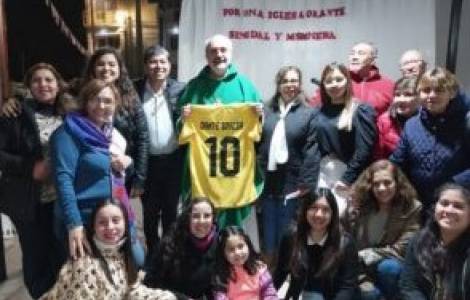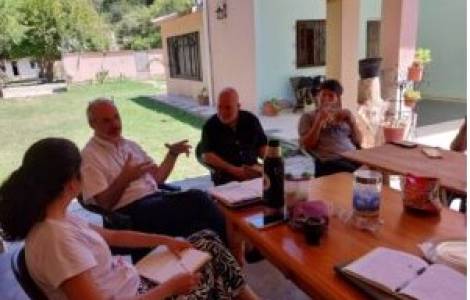
Diocesis de La Rioja
La Rioja (Agenzia Fides) - "Social pastoral care is a fundamental dimension of the Church's mission, which seeks to make the Kingdom of God present amidst the difficulties and challenges of daily life," said Dante Braida, President of the Episcopal Commission for Social Pastoral Care and Bishop of the Diocese of La Rioja, who pointed out that "this action promotes a Church close to its citizens, concerned with the problems of its community and committed to justice and solidarity." The Prelate considers social pastoral care a fundamental area in the Church's interaction with society, especially in the context of an outgoing Church.
Bishop Braida's goal is "a social pastoral ministry that strengthens and promotes four main axes: the social dimension of faith, so that every Christian can exercise their identity in the social commitments they assume; participation as a citizen, that is, as part of social life; the protection of the environment and the way in which we deal with addictions, the meaning and care of life and everything that damages it, such as drug trafficking."
"There are many reasons to have hope," the bishop continued. "When a family is founded, opens itself to life, grows, and raises its children, that is a very strong sign of hope. When people launch new entrepreneurial initiatives to serve society; when children, adolescents, and young people want to study and develop professionally in sports, the arts, and science. Other signs of hope are when society cares for its elderly; a society that cultivates its faith, that gives space to God and wants to be guided by Him, that is a sign of hope."
"Local parishes, in particular, and the entire diocese, which has a diverse population and significant social challenges, are committed to addressing the social reality of their community. The support of priests, sisters, and lay people, as well as that of Bishop Braida, is fundamental," Sister Silvia Somaré, missionary of the "Hermanas Esclavas del Corazón de Jesús" (ecj) in La Rioja and member of the diocesan press office, told Fides. "The presence of indigenous communities is notable, as is the existence of rural areas with high rates of poverty and difficulties in accessing basic services. Another precarious situation is social inequality, manifested in the gap between the most privileged and the most vulnerable. This situation is exacerbated in some suburbs of the capital and in the inland cities, where a lack of opportunities and unstable job security lead to exclusion and marginalization."
In light of this reality, several social pastoral measures have been launched to support the most vulnerable communities and promote their integral development. These measures are based on the principles of the Church's social doctrine, which promotes human dignity, social justice, and the common good. Among the most important initiatives are the distribution of food and the establishment of community kitchens for families in vulnerable situations; initiatives aimed at strengthening the social fabric and creating development opportunities for communities through training workshops, micro-enterprises, and productive projects; support for the homeless, drug addicts, or victims of violence through comprehensive assistance programs, personalized care, and support through soup kitchens; the promotion of local culture and identity; and networking with other institutions.
"The entire Church in La Rioja remains committed to building a more just and fraternal society, where everyone has the opportunity to develop their potential and live with dignity," Sister Silvia concluded. (AP) (Agenzia Fides, 28/3/2025)

Diocesis de La Rioja